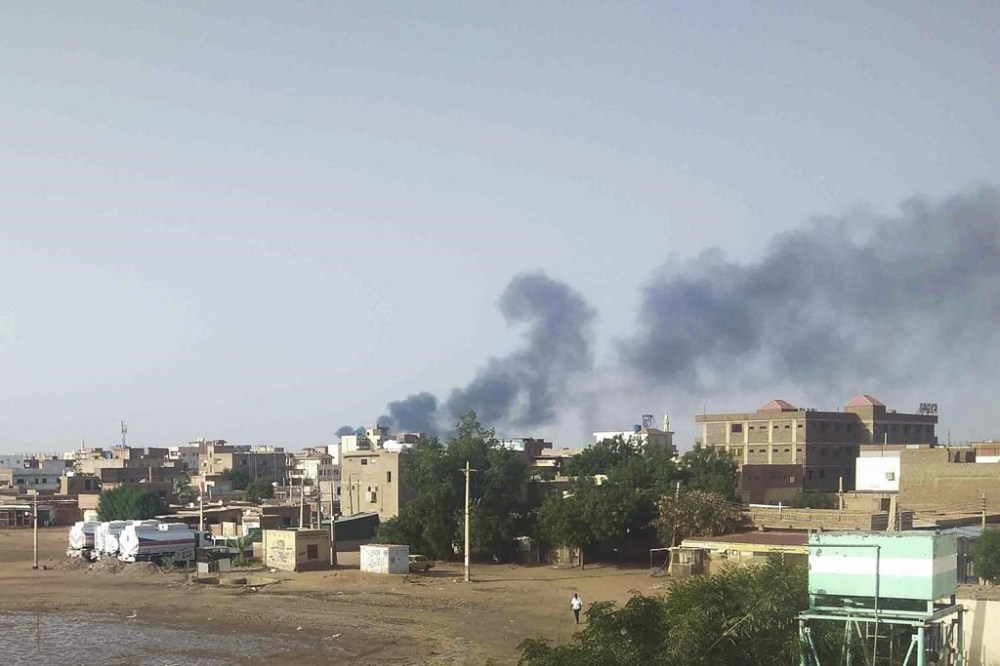Sudan violence likely to push over 1 million refugees out of the African country by October, UN says
Advertisement
Read this article for free:
or
Already have an account? Log in here »
To continue reading, please subscribe:
Monthly Digital Subscription
$0 for the first 4 weeks*
- Enjoy unlimited reading on winnipegfreepress.com
- Read the E-Edition, our digital replica newspaper
- Access News Break, our award-winning app
- Play interactive puzzles
*No charge for 4 weeks then price increases to the regular rate of $19.00 plus GST every four weeks. Offer available to new and qualified returning subscribers only. Cancel any time.
Monthly Digital Subscription
$4.75/week*
- Enjoy unlimited reading on winnipegfreepress.com
- Read the E-Edition, our digital replica newspaper
- Access News Break, our award-winning app
- Play interactive puzzles
*Billed as $19 plus GST every four weeks. Cancel any time.
To continue reading, please subscribe:
Add Free Press access to your Brandon Sun subscription for only an additional
$1 for the first 4 weeks*
*Your next subscription payment will increase by $1.00 and you will be charged $16.99 plus GST for four weeks. After four weeks, your payment will increase to $23.99 plus GST every four weeks.
Read unlimited articles for free today:
or
Already have an account? Log in here »
Hey there, time traveller!
This article was published 27/06/2023 (860 days ago), so information in it may no longer be current.
CAIRO (AP) — The United Nations said Tuesday the surging violence in Sudan is likely to drive more than 1 million refugees out of the African country by October, as the 10-week conflict shows few signs of easing.
Sudan descended into chaos after fighting erupted in mid-April between the military, led by Gen. Abdel-Fattah Burhan, and the paramilitary Rapid Support Forces, commanded by Gen. Mohammed Hamdan Dagalo. Since then, over 3,000 people have been killed, the country’s Health Ministry said, while about 2.5 million people have been displaced, according to the U.N.
The violence has been most acute in the capital, Khartoum, but also in the western Darfur region, where RSF and Arab militias are reportedly targeting non-Arab tribes, local rights groups and the U.N. said. Most of those who have escaped have fled east to Chad.

“We were talking about 100,000 people in six months (fleeing to) Chad. And now the colleagues in Chad have revised their figures to 245,000,” said Raouf Mazou, assistant secretary-general at United Nations High Commission for Refugees, at a news conference in the Swiss city of Geneva.
The province of West Darfur has seen some of the worst violence. In a report last week issued by the Dar Masalit sultanate, the leader of the African Masalit ethnic community accused the RSF and Arab militias of “committing genocide against African civilians.” He estimated that more than 5,000 people were killed in the province’s capital, Genena, over the past two months.
So far over 560,000 Sudanese have escaped to neighboring countries, with Egypt being the primary destination. “We expect, unfortunately, looking at the trends, that the conflict will continue and that many in Sudan will opt to (go to) Egypt,” Mazou said.
Peace negations mediated by the U.S. and Saudi Arabia in the Saudi coastal town of Jeddah have all but broken down. The talks, which led to at last nine cease-fires, were formally adjourned last week with both mediators publicly criticizing the RSF and the army for continually violating agreed truces.
Throughout the conflict, residential areas and hospitals in Khartoum have been pounded by army airstrikes, while RSF troops — who have the upper hand on the city’s streets — have commandeered civilian homes across the capital and turned them into bases.
Sexual violence, including the rape of women and girls, has been reported in Khartoum and Darfur. Almost all reported cases of sexual attacks were blamed on the RSF, which hasn’t responded to repeated requests for comment.
Late on Monday, the RSF said it would establish an internal body to assess and punish paramilitary troops accused of “violations and misconduct.” In a voice recording posted on his social media page, Dagalo said that many of the purported crimes have in fact been committed by affiliates of former Islamist leader Omar al-Bashir and other militias who had disguised themselves in RSF uniforms.
Former president al-Bashir, who led Sudan for 30 years, was toppled in a popular uprising in 2019. From the start of the conflict, Dagalo has accused the army of harboring Islamists and other affiliates of the ousted president within its ranks.
Over the past few days, new clashes also erupted between the Sudanese army and the country’s largest rebel force, the Sudan Popular Liberation Movement–North, in the remote Blue Nile state. The outburst of fighting has pushed hundreds of civilians into neighboring Ethiopia, the U.N.’s mission in Sudan said. It remains unclear how many people have been killed in the clashes
The southeastern pocket of the country was the scene of intense tribal clashes that killed over 170 people in October last year.

